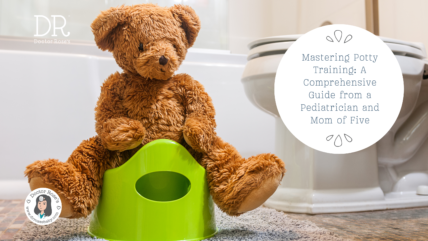Bringing a new baby into the world is a momentous occasion filled with joy, excitement, and anticipation. As a pediatrician and a mom of five, I’ve witnessed firsthand the incredible journey of pregnancy, childbirth, and bringing a newborn home. While it’s natural to focus on the excitement of preparing for your baby’s arrival, it’s also important to plan for the unexpected and ensure you’re ready for whatever may come your way. From unexpected complications during labor to unforeseen challenges in the early days of parenthood, there are countless variables to consider when planning for your newborn’s arrival. In this blog, I’ll share some expert tips for expecting parents to help you prepare for the unexpected and navigate the journey of bringing your newborn home with confidence and peace of mind.
-
Create a Birth Plan

While it’s impossible to predict exactly how labor and delivery will unfold, creating a birth plan can help you communicate your preferences and wishes to your healthcare team. Discuss your birth plan with your obstetrician or midwife and be open to flexibility as circumstances may change. Include important details such as your preferred labor and delivery positions, pain management preferences, and plans for interventions like induction or cesarean section. Consider including contingency plans for unexpected scenarios, such as a change in your baby’s position or the need for medical interventions.
-
Attend a Childbirth Preparation Class

One excellent way to prepare for the unexpected when bringing your newborn home is to attend a childbirth preparation class. These classes are specifically designed to educate expectant parents about the various stages of labor, pain management options, medical interventions, and newborn care basics. By participating in a childbirth preparation class, you’ll gain valuable knowledge and skills that can help you feel more confident and empowered during labor and delivery, as well as in the early days of parenthood. Additionally, these classes often provide opportunities to ask questions, connect with other expectant parents, and learn practical techniques for coping with labor pain and managing stress. Consider enrolling in a childbirth preparation class offered by your healthcare provider, local hospital, or birthing center to prepare yourself for the unexpected and make informed decisions about your birth experience.
-
Pack a Hospital Bag

Preparing a hospital bag in advance can help ensure you have everything you need for labor, delivery, and the immediate postpartum period. Pack essentials for both you and your baby, including comfortable clothing, toiletries, snacks, and entertainment for yourself, as well as diapers, wipes, clothing, and a blanket for your baby. Don’t forget to include important documents such as your birth plan, insurance information, and contact details for your healthcare providers. Consider packing a few comfort items from home, such as a favorite pillow or blanket, to help create a familiar and soothing environment in the hospital.
-
Set Up Your Newborn’s Nursery

Creating a cozy and functional nursery for your newborn is an exciting part of preparing for their arrival. Set up essential furniture and equipment such as a crib or bassinet, a changing table or dresser, and a comfortable rocking chair or glider for feeding and soothing. Stock up on baby essentials such as diapers, wipes, clothing, and bedding, as well as feeding supplies like bottles, nipples, and formula or breast pump accessories if needed. Consider organizing your baby’s nursery in a way that makes caregiving tasks more efficient and convenient, such as setting up a diaper changing station with all the necessary supplies within arm’s reach.
-
Build a Support Network

Having a strong support network in place can be invaluable when navigating the unexpected challenges of parenthood. Reach out to friends, family members, and trusted healthcare providers for support, encouragement, and practical assistance during pregnancy, childbirth, and the early postpartum period. Consider joining a prenatal or postpartum support group where you can connect with other expectant or new parents who are going through similar experiences. Don’t hesitate to ask for help when you need it, whether it’s with household chores, childcare, or emotional support.
-
Prepare for the Unexpected

While it’s impossible to anticipate every possible scenario, there are steps you can take to prepare for the unexpected when bringing your newborn home. Familiarize yourself with common signs and symptoms of newborn health issues, such as jaundice, feeding difficulties, and respiratory problems, and know when to seek medical attention. Keep important contact information for your healthcare providers, including your pediatrician and lactation consultant, easily accessible in case of emergencies. Consider taking a CPR and first aid class for infants and young children to learn life-saving skills and gain confidence in your ability to respond to emergencies.
-
Practice Self-Care

Taking care of yourself is essential for your physical, mental, and emotional well-being during the postpartum period. Prioritize self-care activities that help you relax, recharge, and rejuvenate, whether it’s taking a warm bath, going for a walk in nature, or practicing mindfulness and meditation. Make time for activities that bring you joy and fulfillment, such as spending time with loved ones, pursuing hobbies, or indulging in your favorite activities. Remember, self-care isn’t selfish – it’s essential for your overall health and well-being, and it enables you to be the best parent you can be for your baby.
-
Trust Your Instincts

Above all, trust your instincts as a parent and advocate for yourself and your baby. You know your baby better than anyone else, and your intuition is a powerful tool for navigating the unexpected challenges of parenthood. If something doesn’t feel right or if you have concerns about your baby’s health or well-being, don’t hesitate to reach out to your healthcare provider for guidance and support. Remember, you’re not alone in this journey, and there are resources and support available to help you every step of the way.
Planning for the unexpected when preparing to bring your newborn home requires careful preparation, flexibility, and resilience. By educating yourself, creating a birth plan, packing a hospital bag, setting up your baby’s nursery, building a support network, preparing for the unexpected, practicing self-care, and trusting your instincts, you can approach parenthood with confidence and peace of mind. Remember, every journey into parenthood is unique, and there’s no one-size-fits-all approach to preparing for your baby’s arrival. Trust yourself, embrace the journey, and savor every moment of this precious time with your newborn.
If you have any questions or need help email me at support@drrosesbaby.com and Sign up to my Newsletter.
Grab your Free Baby Guides here!
Recommended blog: A Pediatrician’s Prescription for Managing Stress as Parent








Leave a Reply
You must be logged in to post a comment.